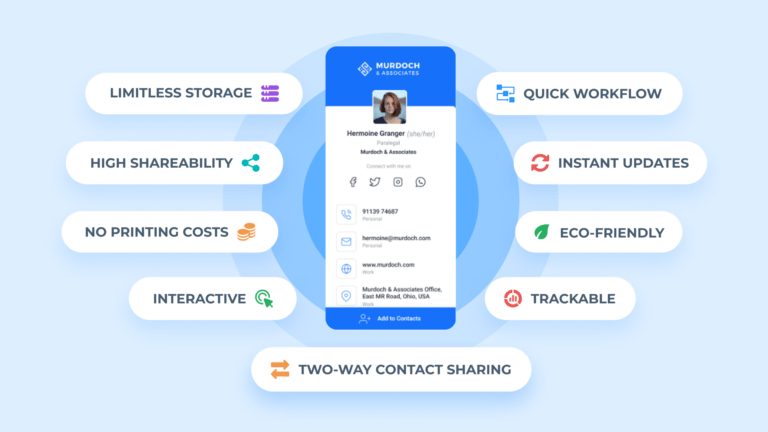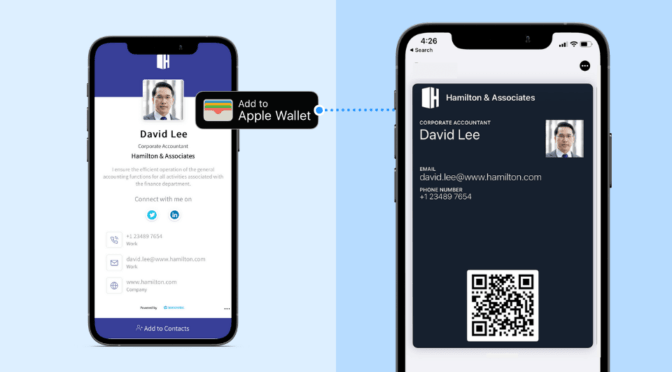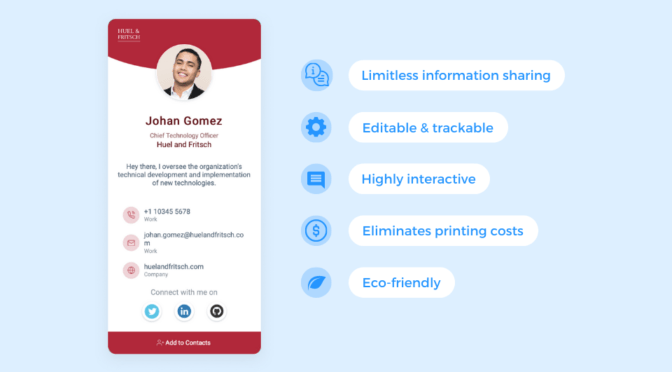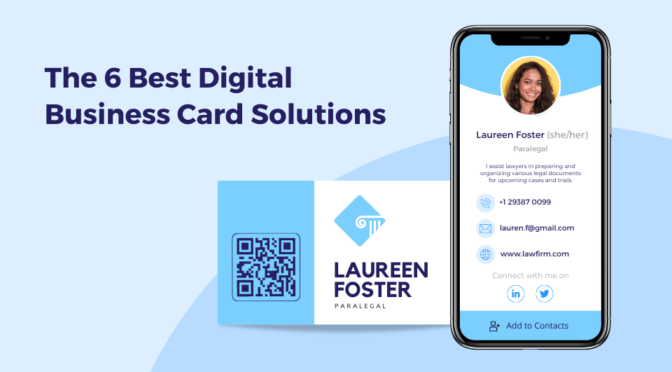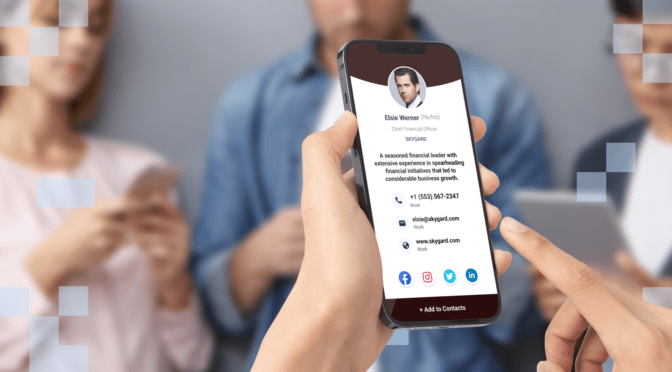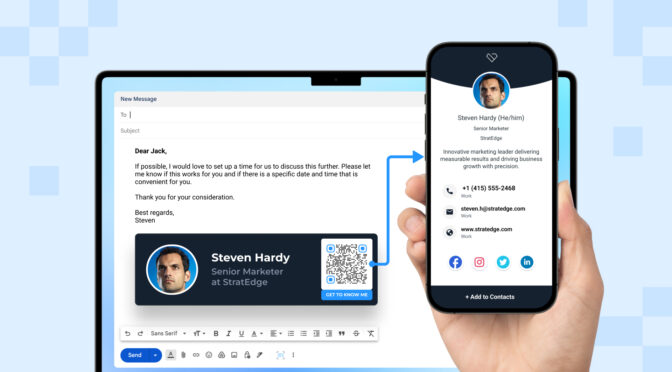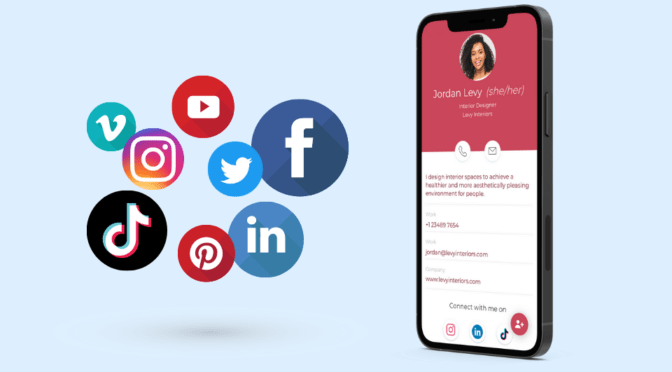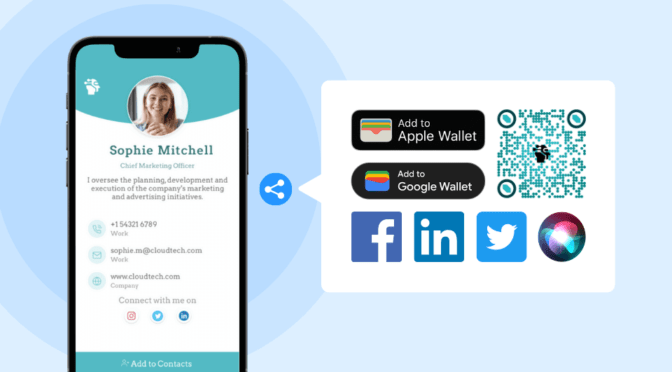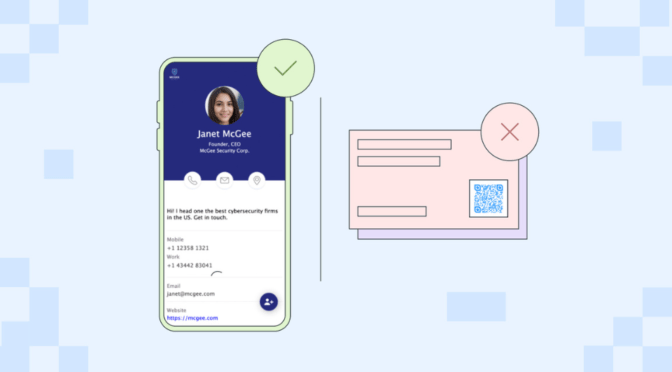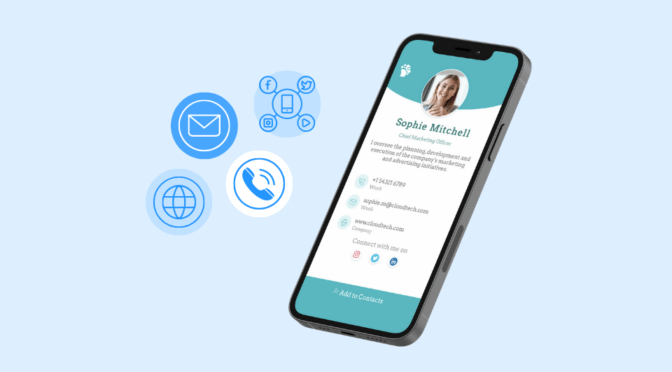💻 Key takeaways:
1. Digital business cards are eco-friendly, cost-effective, and versatile. Unlike paper cards they help in saving time and money by eliminating the need for printing and distribution.
2. Digital business cards are convenient and accessible, making them ideal for seamless networking. With either a QR code embedded in your email signature or on your Zoom background, you can share your cards easily.
3. Choosing a digital business card keeps you connected and makes a lasting impression in today’s digital world. With customizable features, digital cards enhance productivity in networking.
Paper-based business cards have been around for centuries. But digitization has changed the way we network and has brought in novel ways to exchange information.
This is why many businesses are switching from paper cards to digital business cards or e-business cards.
The global market value for digital business cards is growing at a CAGR of 11.2%. This market size is forecasted to reach US$ 242.3 million by 2027, indicating that digital business cards are here to stay. (Source)
Considering the rapid adoption of digital business cards, its natural that you wonder if digital business cards are a worthy investment.
This article will help you understand the top 10 benefits of digital business cards and help you understand why switching to e-business cards is a good idea.
- The top 10 digital business card benefits: For maximized networking ROI
- Next step? Make an e-business card with the best digital business card solution
- Frequently asked questions
The top 10 benefits of digital business cards
- Share an unlimited amount of information
- Quick and contactless card-sharing
- Cost-efficient and budget friendly
- Avoid the hassle of paper business card procurement
- Streamline client communication
- Enable two-way contact sharing to collect leads
- Monitor performance metrics and track engagement
- Update your e-business card in real-time
- Eco-friendly and sustainable
- Maximizing networking ROI

1. Share unlimited information via digital business cards
Traditional business cards are limited by their small size, forcing you to choose which details to include. Sharing multiple phone numbers, emails, URLs, and social media handles is nearly impossible on a 3.5” x 2” card.
Digital business cards come to the rescue! They eliminate these limitations, allowing you to share an unlimited amount of information with ease. Recipients can access your details anytime, anywhere, on their mobile devices or computers.
With an e-business card, you can include:
- All your contact numbers
- Website links
- Social media handles
- Google Maps location
- And much more!
This ensures you provide comprehensive contact information and create a more impactful networking experience.
LEARN: What information can you include on a digital business card
2. Leverage quick and contactless card-sharing with e-business cards
When you use paper business cards, you are required to share them face-to-face, which often involves physical contact.
In contrast, you can share a digital business card through the following quick and contactless methods—helping you network in a paperless and instant manner.
- Share your digital business card via Apple Wallet (or Google Wallet)
- Send your e-business card to your client using Apple’s Siri
- Directly share your digital business card on social media
- Send your business card as a QR Code
- Forward your card’s URL on various channels, such as SMS and instant messaging apps
- Add your e-business card to your email signature
Check out our complete guide on how to send a digital business card to maximize your networking efforts.
You might want to know: What if you need to distribute hundreds or thousands of e-business cards? Do you need to manually send each card to its owner? Not if you use Uniqode’s digital business card solution.
By turning on the auto-send feature on Uniqode’s dashboard, you can automate the distribution of digital business cards as soon as they are created. Learn more here.
3. Minimize card printing costs with digital business cards
Paper business cards come with a hefty price tag. Annual printing costs per employee can reach $194 per employee, , and the fancier the design, the higher the cost.
Digital business cards offer a significant cost advantage. You save on design, printing, and distribution fees by eliminating printing and reordering needs.
Consider this: Printing 500 paper cards could cost around $95,000. With Uniqode’s digital solution, generating and sharing 500 cards might cost just $12,000-$15,000 annually depending on your plan. That’s a potential cost savings of $83,000 or a whopping 87% per year on business card expenses per employee!

4. Avoid the tedious process of paper business card procurement

According to this study, nearly 90% of organizations are burdened with tedious and repetitive tasks that reduce productivity. The procurement of paper business cards is one such task.
This is how companies typically handle their traditional business card procurement process:
- A new employee eligible for a business card raises a request to their team lead or HR.
- This request is forwarded to the company’s card procurement team—via email or an order management portal.
- Once the request is approved, the card supplier will proceed with creating and printing the business card.
- Once the business card is ready, the supplier delivers it to the company—the delivery time could take days or weeks, depending on various factors such as the number of cards requested, card design requirements, etc.
- If the business card is delivered with an error, the entire process starts all over again.
This process—from start to finish—takes an average of 30 days.
The good news is that you can cut it entirely by switching to e-business cards.
With a digital business card generator, each team in your organization can create and distribute e-business cards to all employees within minutes.
Pro tip: With the Microsoft Azure Active Directory (AD) and Uniqode integration, you can automate the creation of digital business cards as soon as a new employee’s details are added to your Microsoft Azure AD.
Next, you can toggle on the auto-send feature on Uniqode’s dashboard to automate the distribution of digital business cards as soon as they are created.
This means the entire process of creation and distribution of digital business cards will be handled by Uniqode, so you shift your entire focus to other crucial employee onboarding tasks.
5. Turn digital business cards into interactive and two-way channels
Physical business cards do not let your recipients conveniently respond to your shared details.
Yes, you can spur interest with an attractive card loaded with compelling profile information. But acting on that interest through a paper-based card can prove cumbersome for your audience.
This is because they must manually search for shared information on their mobile devices.
With digital business cards, every piece of information becomes accessible via a single screen tap.
For instance, if a client wants to contact you, they can instantly access your phone number in a click-to-call manner through your e-business card. Moreover, your location and social links are accessible in the same way.
6. Enable two-way sharing for instant leads with e-business cards
Digital business cards allow you to take advantage of two-way contact sharing. This helps you capture your client’s contact information directly from your digital business card.
For instance, a field sales agent manages to pique a prospect’s interest in their product. The prospect turns warm, and the agent uses the opportunity to ask the prospect for their contact details.
With two-way contact-sharing, the prospect only needs to fill out and submit a contact form via the agent’s digital business card. Upon submission, the prospect’s details will be recorded in the agent’s digital address book as a new lead entry. From this address book, the agent can view and manage all the warm leads collected from their digital business card.
With Uniqode, you can integrate this list of leads directly into your company’s Salesforce. You can also connect it to 700+ CRM platforms using Zapier.
In addition to these integration capabilities, you can export your entire leads list into a CSV file, which you can manually import on your company’s CRM software.
7. Track engagement and gauge prospects’ interest with e-business cards

One of the biggest downsides of traditional business cards is their inability to offer performance metrics based on card-scan tracking. Once distributed, you won’t be able to track and analyze the engagement your cards get from your audience.
Digital business cards, in contrast, are completely trackable. They let users monitor recipient engagement, open rates, and other metrics to assess the effectiveness of their cards.
Here are some meaningful metrics you can track:
- The total number of card scans received.
- The number of times your contact details were saved
- The number of total and unique clients reached via your cards.
- The best- and worst-performing digital business cards—based on the total number of scans each card gets.
- The card engagement by location, time of day, and device—you can monitor when and where your team members engage with clients.
We recommend choosing a capable digital business card solution that can help you monitor the above metrics in real-time. This way, you can easily determine card engagement metrics and optimize your networking efforts.
Pro tip: In addition to capturing and monitoring first-party data, you can retarget users on Facebook and Google through Uniqode. This gives you a second chance to convert people who have shown interest in your business but haven’t converted yet.
8. Update your digital business cards as and when required

It is no secret that even the slightest information update can make your existing paper business card outdated. If you want to update the details on your card, you’ll have to reprint the card, resulting in additional costs and extended card procurement turnaround time.
This is one of the reasons why the switch to e-business cards is more efficient.
Digital business cards can be updated in real-time, ensuring that recipients always have access to the most current contact information and other details. You can change any piece of information—be it a contact number, web link, or Google Maps location. You can even change your business card’s design elements.
The best part? These updates can be made at the backend—on your digital business card provider’s dashboard. As a result, your clients can view your updated e-business card in real-time—without you having to share the card again.
9. Opt for eco-friendly alternatives to traditional business cards
As we learned above, paper business cards incur high annual printing costs. But printing costs might not be the only reason to switch to digital business cards.
Over 7 million trees are cut down each year to accommodate the demands for paper-based business cards. So it might be no surprise that 82% of consumers prefer companies that put people and the planet first before their bottom line.
If your audience is inclined to prefer companies that adopt sustainable solutions, switching to e-business cards can benefit your brand. Not only do you get to save significant amounts of paper, but also massive printing costs—simply by going digital with your business cards.
By reducing paper usage and waste, digital business cards contribute to environmental sustainability and align with eco-friendly business practices.
Check out our guide on why digital business cards are also known as eco-friendly business cards to learn more.
10. Maximize ROI with digital business cards
Imagine a potential client at a virtual event. Using a digital business card, a simple QR code displayed in your Zoom background allows them to instantly access your contact information.
Further digital business cards typically include an “Add to Contacts” button, allowing prospects to save your information with a single tap on their smartphone. This translates to faster follow-up and potentially shorter sales cycles, leading to quicker conversions.
Unlike paper cards, digital solutions often come with built-in analytics. You can track how many people viewed your card, where they found it (website, social media), and even their location. This valuable data allows you to target your marketing efforts more effectively and identify the channels that generate the highest return on investment.
Next step? Make an e-business card with the best digital business card solution
There you have it, the 10 top benefits of digital business cards that make your networking more effective and eco-friendly.
Now, if you truly wish to capitalize on these benefits, it’s essential to choose the best digital business card solution. This way, you will be able to create a digital business card that best represents your value and services.
In addition to offering the above-mentioned benefits, Uniqode’s digital business card solution boosts your networking endeavors through enterprise-grade security standards—without the need to download any app.

Frequently asked questions
Physical vs. digital business cards: What’s the difference?
Physical and digital business cards aim to achieve the same purpose—to convey contact information about a professional or a business. But, to understand the differences, we must look at the factors influencing networking success through business cards.
These factors are shareability, interactivity, information sharing, and printing costs.
- Shareability – The only way to share paper business cards is in person. Meanwhile, you can share e-business cards through various digital means such as Apple or Google Wallet, QR Code, etc.
- Interactivity – Physical cards require your recipients to search for shared details manually. Whereas e-business cards provide instant information access with a single screen tap.
- Information sharing – Physical cards bind you to a limited content space. With digital business cards, you can include as much information as you want.
- Printing costs – The average cost of physical business cards for a single employee is $194 a year. Alternatively, you can create a customizable and trackable e-business card at a 98% lesser cost.
Are digital business cards worth it for your networking?
For your networking ROI, yes. These virtual networking tools can help you maximize your networking efforts in a contactless, cost-effective, and eco-friendly manner. Check out our post on why digital business cards are the best paper business card alternative.
How much does it cost to create a digital business card?
With Uniqode, you can create a digital business card for free! As you scale to higher-tiered plans for teams or businesses, the more cost-savings you get per card.
Create a free digital business card today!







